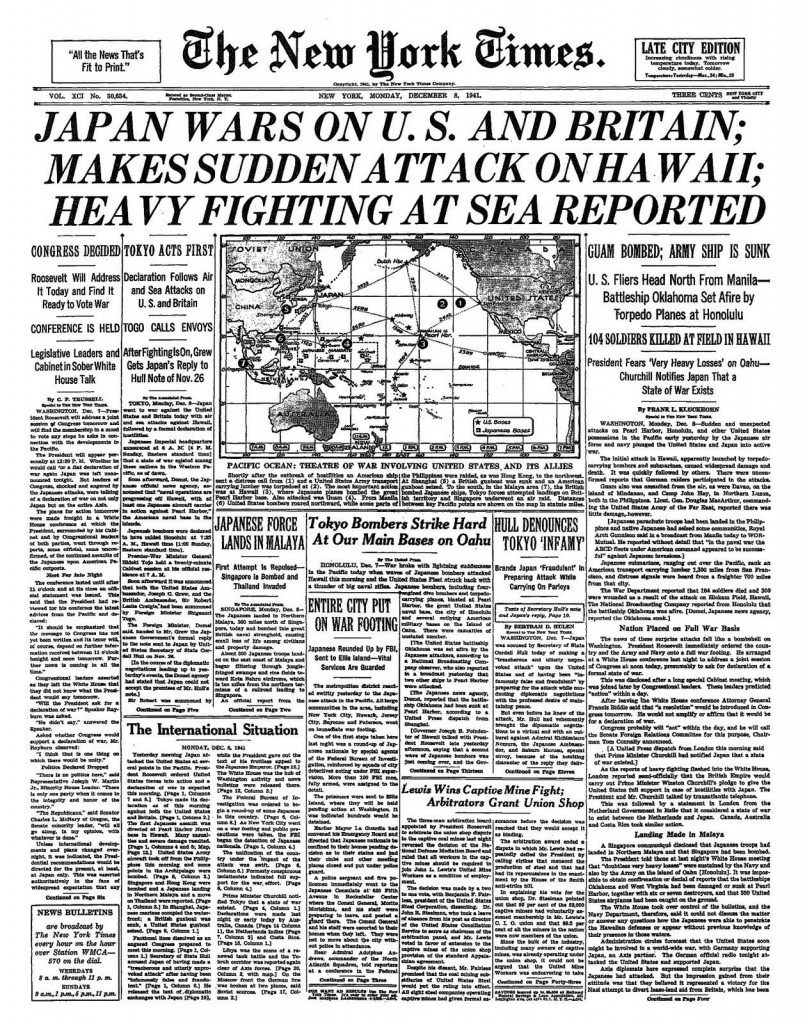
Alex Green
Triangle Reporter
Yesterday was a date “which will live in infamy”. On December 7, 1941, six Japanese aircraft carriers set sail on a mission that would tilt the scale of World War II and forever change the landscape of the Pacific – and the world.
On December 7, 2011 – 70 years after the surprise attack on the United States’ Navy and ten years after the surprise terrorist attack on the World Trade Center in New York City – Americans woke up.
Mainers first saw the glint of sunlight on the briny foam of the Atlantic as water slapped sheer rock and lobster boats bobbed around in the hundreds of harbors along the vast coastline.
Folks in the hills of Pennsylvania and West Virginia, followed by those west of the Appalachians got out of warm beds and turned on the morning news while sipping home-brewed coffee and watched light grow gradually brighter through the blinds of their coffee-scented kitchens.
Texas, Oklahoma, Nebraska and the heartland woke up a few hours after. The lights of Las Vegas grew dim in the contrast of nature’s light. California, Los Angeles to Humboldt, dawned eventually, sunlight ripping down the slopes of the Cascade Mountains.
But even much later – five hours after the eastern seaboard – light hit the USS Arizona Memorial near Honolulu, Hawaii.
Below the glassy surface of the seawater, 1, 102 American sailors sleep eternally in a steel tomb. 70 years ago to the day, they were flitting around the warship Arizona amidst the hum of Japanese prop-engine fighters and the roar of oil-fed fires in the scenic harbor.
Among the carnage, Clarence Pfundheller, a 21-year-old Iowa native, witnessed one of the most influential days in world history.
“You could see them [Japanese pilots] pumping their fists and laughing at you,” the veteran told the Lake County News-Sun earlier this month in an anniversary feature that the newspaper ran.
On that day, America had been thrust – gleefully, as Pfundheller illustrated – involuntarily into World War II; Despite looming clouds of war over the Americas, circumstances had yet to tug a reluctant, economically reeling United States into the growing global fight.
Adolf Hitler was reportedly jubilant when he received word of Japan’s attack on the U.S. Finally, after months of United States-Britain meetings and the U.S. providing “secret” aid to Britain, Hitler could take off the gloves. Japan had done what Hitler would have ultimately had to do in dragging the U.S. in.
It was no secret that America’s role in the war could be the pendulum that cut either the Allies’ or the Axis’ throats depending on what route the country took. The world held its breath. Hitler prepped. Realization set in on the island of Japan.
Commander-In-Chief of the Imperial Japanese Navy Isoroku Yamamoto said one month after the attack, “A military man can scarcely pride himself on having ‘smitten a sleeping enemy’; it is more a matter of shame, simply, for the one smitten.”
On December 8, America responded.
President Franklin D. Roosevelt decisively and unquestionably declared war on Japan.
“Yesterday, December 7, 1941 – a day that will live in infamy – the United States of America was suddenly and deliberately attacked…” said Roosevelt to the Congress. “The facts of yesterday and today speak for themselves. The people of the United States have already formed their opinions and well understand the implications to the very life and safety of our nation.”
Despite Japan’s intentions to strong-arm America into renegotiating economic sanctions that had been levied against the Japanese government, angry, vindictive reprisal came out of Washington.
In many ways, America found – and is finding – itself breathing a sigh of relief 70 years later to the day. Despite recent hardships that are comparable, ironically, only to what Americans endured in the ‘30s and ‘40s, the nation has nearly one more under its belt.
It has 70 under its belt, actually. And as Americans – and the world – now tally the years in contrast to September 11, the annual remembrance of Pearl Harbor appears to be slowly and quietly dying away with its generation.
On December 7, 2011, fog and smog in China was the headliner on one major news network’s website. Yesterday was a milestone; it’s hard to see the 70th anniversary of September 11, 2001 on the horizon – especially when China-dominated headlines are more and more the norm.
